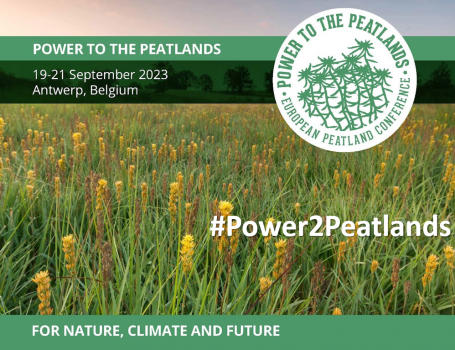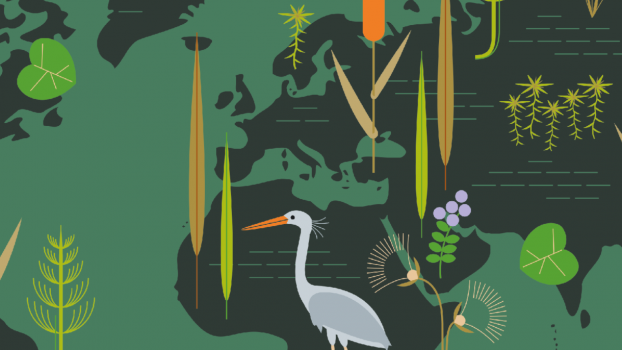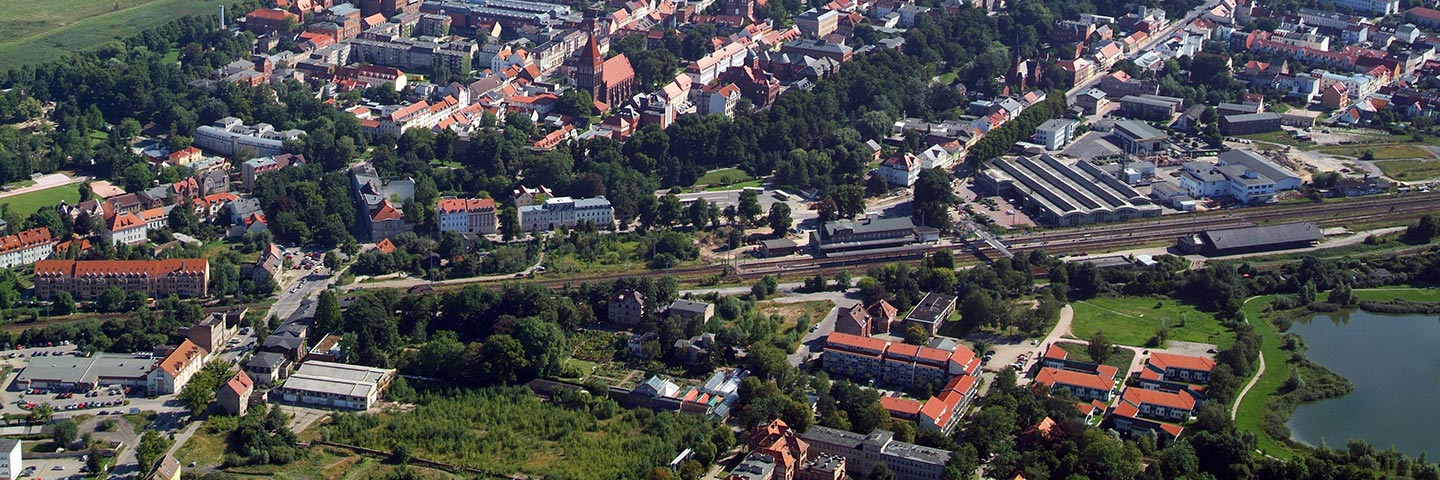News/All pieces
Photovoltaics on peatlands
Interesting? There are jobs here...
11/21/2023 Do you find photovoltaics on #peatlands interesting? Is this possible and - if so - what effects does it have on biodiversity, greenhouse gases, the formation of peat and the growth of biomass? There are currently two job offers for positions for scientific staff in the Peatlands Research and Experimental Plant Ecology working groups at the University of Greifswald - with the option of a doctorate!
Breakthrough in EU Nature Restoration Law
Webinar: What's next?
10/11/2023 Good news is not always bad news! After today's Friday, the EU Parliament, the EU Commission and the European Council agreed on the law to save nature - the EU Nature Restoration Law (NRL) - in the European Union. It is the largest nature conservation law in 30 years and a breakthrough. Peatlands have also now been included in the law - after they were temporarily no longer taken into account in the negotiations. But what exactly is in the law, when does it come into force and what happens next? An express webinar on the NRL - free and for everyone - explains all this online today at 6 p.m.: Jutta Paulus, MEP, negotiator for the EU renaturation law and environmental policy spokesperson for The Greens/EFA in the European Parliament, Jan-Niclas Gesenhues, environmental policy spokesman for the Alliance 90/The Greens parliamentary group in the German Bundestag and Franziska Tanneberger, head of the Greifswald Mire Centre, University of Greifswald, moderated by Maximilian Fries, Managing Director of Europe Calling e.V.
New poster exhibition
More "ruMooren"
25/10/2023 What is a bog and where exactly is it? What do these bogs emit and is that bad? Can peatlands really help us? The compact, mobile poster exhibition at the Greifswald Mire Centre (GMC) provides questions and answers. From October 24th to November 29th it can be seen in the foyer of the Hans Fallada City Library in Greifswald with seven posters based on the texts and with graphics from the Mooratlas, compiled in the MoKKa project. It can then be shown at other locations upon request.
For Library Day
Reading and poster exhibition
10/23/2023 For Library Day 2023 on October 24th: More ruMOORen! While reading from her book "Das Moor" in the Greifswald city library, Franziska Tanneberger takes Hans Fallada camping on swinging ground in Siberia or bird watching in Senegal. It's about the landscapes between water and land on different continents and also right on our doorstep. In combination, the city library is showing the new poster exhibition "More ruMOORen - moory questions and answers with numbers from the Peatland Atlas". The reading begins at 7 p.m. and admission is free. Not to be forgotten on this day: the Peatland and Nature Conservation International Library (PeNCIL) of the Greifswald Mire Centre. The renovation of an old lecture hall is currently underway in order to be able to preserve, present and use the holdings in sufficient space. The opening is planned for 2024. We're looking forward to it.
A market for peatlands
1 million ha in Germany potentially wet and usable
10/13/2023 Nationwide, 1 million hectares of agriculturally used, drained peatlands can be rewetted and their potential for climate protection and the economy can be increased - according to the results of a study commissioned by the toMOORow initiative. In the best case, almost the entire area can be used for climate-friendly wet farming (paludiculture). In the sectors examined, a market share of 15% would have to be achieved for biomass produced on moors. The paper and packaging, construction and insulation materials, energy and plastics industries in particular can use paludi-biomass. The use of renewable raw materials offers great potential in the event of raw material shortages (e.g. wood), replaces fossil resources and thus improves the carbon footprint of companies. At the same time, regional and therefore reliable supply chains are used, which enable savings in transport. The biomass from peatlands is suitable for a wide range of new products and has great potential for both the circular economy and the credible sustainability positioning of companies. “Preliminary study on the creation of scalable value chains for the use of Paludi biomass” is the name of the current publication of the toMOORow initiative, which was launched by the Michael Otto Environmental Foundation and the Succow Foundation. The study examined four scenarios and shows that paludiculture would be possible on an industry-relevant scale and at the same time profitable for owners, producers and users and a big plus for climate protection.
Power to the Peatlands

Final conference statement
21/09/2023 The landmark conference from 19th to 21th September 2023 in Antwerp, Belgium, aiming to reposition peatlands at the core of European nature and climate policy, came out with a declaration for European policymakers. More than 500 peat experts present co-created this call to action "Empower nature, climate and future now!". In six main points the declaration emphasises: For peatlands we must act now and together! With 15 talks and ten poster presentations, the GMC was represented at the largest gathering of peatland experts ever held on the globe - the ‘Power to the Peatlands’. In the presentations, GMC members answered questions such as how paludiculture can be used in fens to combat eutrophication, biodiversity loss and the climate crisis. Or whether cattails filter enough water for peat moss cultures and how the peatlands of the Baltic Sea region have developed over the last four decades. The poster presentations ranged from cattail and peat moss cultivation in Germany, to analyses of peatland development via satellite data in the Baltic Sea region, to a literature study on peatlands of the Amazon region. The GMC was one of the partner organisations of the conference and supported its preparation in various committees. Via the PRINCESS project, facilitation of the conference declaration was provided.
New: MoorNet
All peatland projects in Germany to click through
09/16/2023 Now online: The MoorNet database lists all peatland projects and funding programs in Germany, whether completed or ongoing, and is continuously updated. On October 11, 2023, it will present itself and its offers online for anyone interested from 10 a.m. to 12 p.m. The event provides an overview of MoorNet and its current status. As part of the national peatlands protection strategy and networking project, MoorNet is intended to support peatlands protection in Germany and organizations and people active in this regard through information about projects, funding instruments, events and new findings as well as other activities. MoorNet is run by Ecologic Institute and Greifswald Mire Centre on behalf of the Federal Agency for Nature Conservation.
Peatlands on MeLa 2023
Joint specialist forum of the farmers' association MV and GMC
11/09/2023 How can #peatlands be managed sustainably? Together, the Farmers' Association M-V and Greifswald Mire Centre will address the problems and perspectives at a joint specialist forum at the MeLa agricultural trade fair in Mühlengeez. On Thursday from 1:30 p.m. to 2:30 p.m. at the entrance to Hall 2, after two short specialist lectures, there will be an opportunity for a detailed discussion about the problems and perspectives of the climate-friendly use of wet moorland.
Necessary for the mire reversal
New: information paper on the climate protection program
10/09/2023 The forest is currently under great scrutiny as a beacon of hope for the LULUCF area of the Climate Protection Program (KSP), but peatlands will become significantly more important. This is what the Greifswald Mire Centre sees and justifies in the Greifswald Mire Centre's current statement on the draft of the 2023 climate protection program. Simply referring to the measures of the Natural Climate Protection Action Program or the National Peatlands Protection Strategy in the KSP is not enough, criticizes the information paper. A change in the moorland should be considered beyond the legislative period and at the same time as the National Strategic Plan of the Common Agricultural Policy (CAP), including reducing climate-damaging subsidies and providing financial incentives for paludiculture.
Coming up in English
The Peatland Atlas
07/09/2023 The Mooratlas, which was published in January, has attracted great interest in Germany and - though in German - even beyond- That's why it will now also be available in English for a broad international audience. You can join the launch of the Peatland Atlas on the European political stage in Brussels on September 18th at 12:30 p.m. - on site or via livestream. René Böll, artist and co-founder Heinrich-Böll-Foundation, will speak at the opening. The Peatland Atlas is available online as early as September 11th here.
The Peatland Atlas and its launch are a joint project of Succow Foundation, partner in the Greifswald Moor Centrum, BUND - Friends of the Earth Germany and the Heinrich-Böll-Foundation in cooperation with the Global Peatland Initiative.









